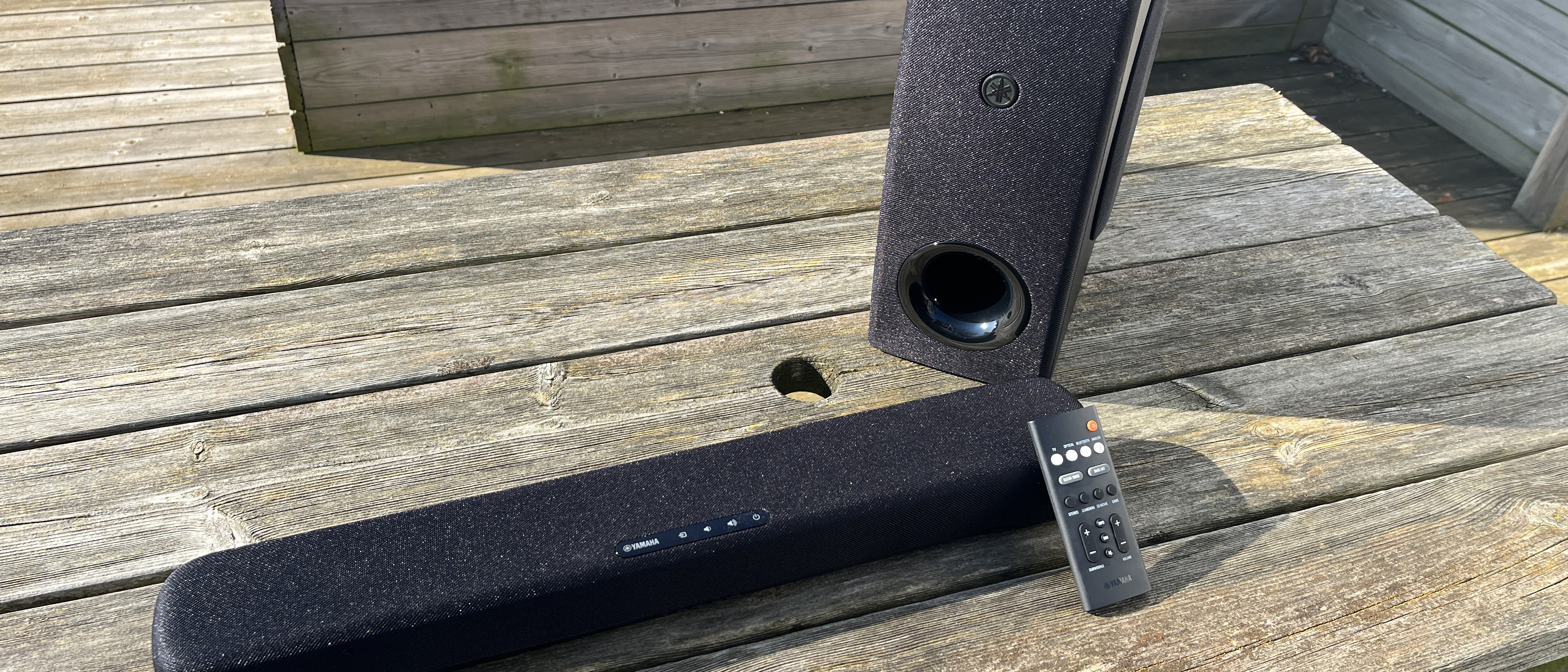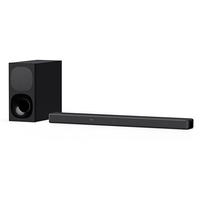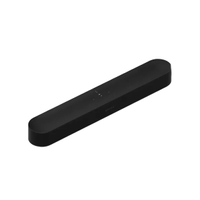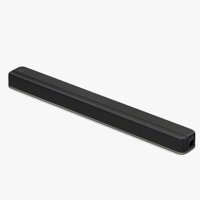TechRadar Verdict
Flexible and likeable, the Yamaha SR-C30A is, in some ways, the ideal affordable soundbar/subwoofer combo. It’s not quite a slam dunk in every department, and won't satisfy those looking for Dolby Atmos thrills, but it's an excellent option overall if you want power in a smaller size.
Pros
- +
Brilliantly compact design
- +
Robust, full-range sound
- +
Proper control options
Cons
- -
Doesn’t sound all that expansive
- -
Relationship between sub and soundbar isn’t perfect
Why you can trust TechRadar
Yamaha SR-C30A: One-minute review
There’s a lot to be said for discretion, and as far as soundbars go, the Yamaha SR-C30A is about as discreet as they come. Well, looks-wise, at least. It’s super-compact, and is accompanied by a wireless subwoofer that’s almost as teeny. Between the two of them, they generate a nicely detailed, quite assertive sensation of stereo audio that’s a cut or two above the sound your TV is likely to be able to create by itself when it comes to the clarity of speech and exciting dynamic range.
The Yamaha SR-C30A's build and finish are well up to the standard we’d expect from Yamaha, and the fact that the soundbar is so tiny and light means it’s about as easy to place as these things ever get. Even the best cheap soundbars can be quite large these days, but this is good for 32-inch TVs up to around 50-inch TVs.
But while it sounds quite upfront and articulate, the SR-C30A doesn’t sound especially big. And the limitations of the soundbar means the subwoofer has quite a lot of work to get through – and the fact that they don’t share identical tonality makes for a slightly bumpier ride from the top of the frequency range to the bottom than is strictly ideal. But we're coming at this from a picky audio-reviewer point of view, and now everything will be bothered by it in the same way,
Still, if you don't mind have something a bit larger or paying a little more, you can get something with even more expansive and refined sound, such as the Sony HT-G700 or Sonos Beam 2nd Gen. However, for something at both the size and price of the Yamaha, it's a superb buy overall.
Yamaha SR-C30A review: Price & release date
- Costs $279 / £269 / AU$399
- Released October 2022
Was released in October 2022, and is officially priced at £269 in the UK, $299 in the US, and AU$399.
There’s no shortage of competition where soundbars at this sort of money are concerned, of course – but the SR-C30A has a couple of significant selling points on its side. Firstly, there’s Yamaha’s long and proud heritage where products like this are concerned – poor Yamaha soundbars are about as rare as hen’s teeth.
And then there’s the super-compact dimensions of the SR-C30A – anyone who’s after the least obtrusive soundbar possible, or a soundbar that can easily be moved from one room to another, is going to be all over the SR-C30A like a rash.
However, soundbars have been dropping in price a lot recently, and you can now get competition that includes Dolby Atmos support for around the same price – see the Sony HT-G700 as an example, which has fallen in price a lot since its release in 2020.

Yamaha SR-C30A review: Features
- 90 watts of Class D amplification
- HDMI ARC and Bluetooth 5.0 inputs
- Comes with a remote but you can use your TV's remote
The soundbar/subwoofer combination enjoys 90 watts of Class D power. The subwoofer gets 50 watts to drive its 130mm bass driver, while the soundbar’s pair of 46mm drivers get 20 watts each. As you might expect, this produces 2.1 channels of sound.
Those numbers look perfectly acceptable at first glance, but it’s worth noting that Yamaha has been relatively generous with its parameters. Still, as we all know, it’s not how many watts you have but what you do with them – so the proof is in the listening, not in the reading of the spec sheet.
On the soundbar’s rear, there’s HDMI ARC, a pair of digital optical sockets (one is a duplicate ‘TV’ input in case you’re not making an HDMI connection) and an analogue 3.5mm input. There’s also a USB slot here, but it’s for updates only. Wireless connectivity extends to Bluetooth 5.0, with SBC and AAC codec compatibility.
There are some touch controls on top, and it comes with a remote – but it also takes HDMI control input, so you can just use your TV and never worry about the soundbar's own control unless you want to change modes.
Yamaha's Clear Voice technology is designed to enhance dialogue, while the Adaptive Low Volume system adjusts the frequency expression, so that it still sounds fulsome even at lower volumes.
- Features score: 3.5/5
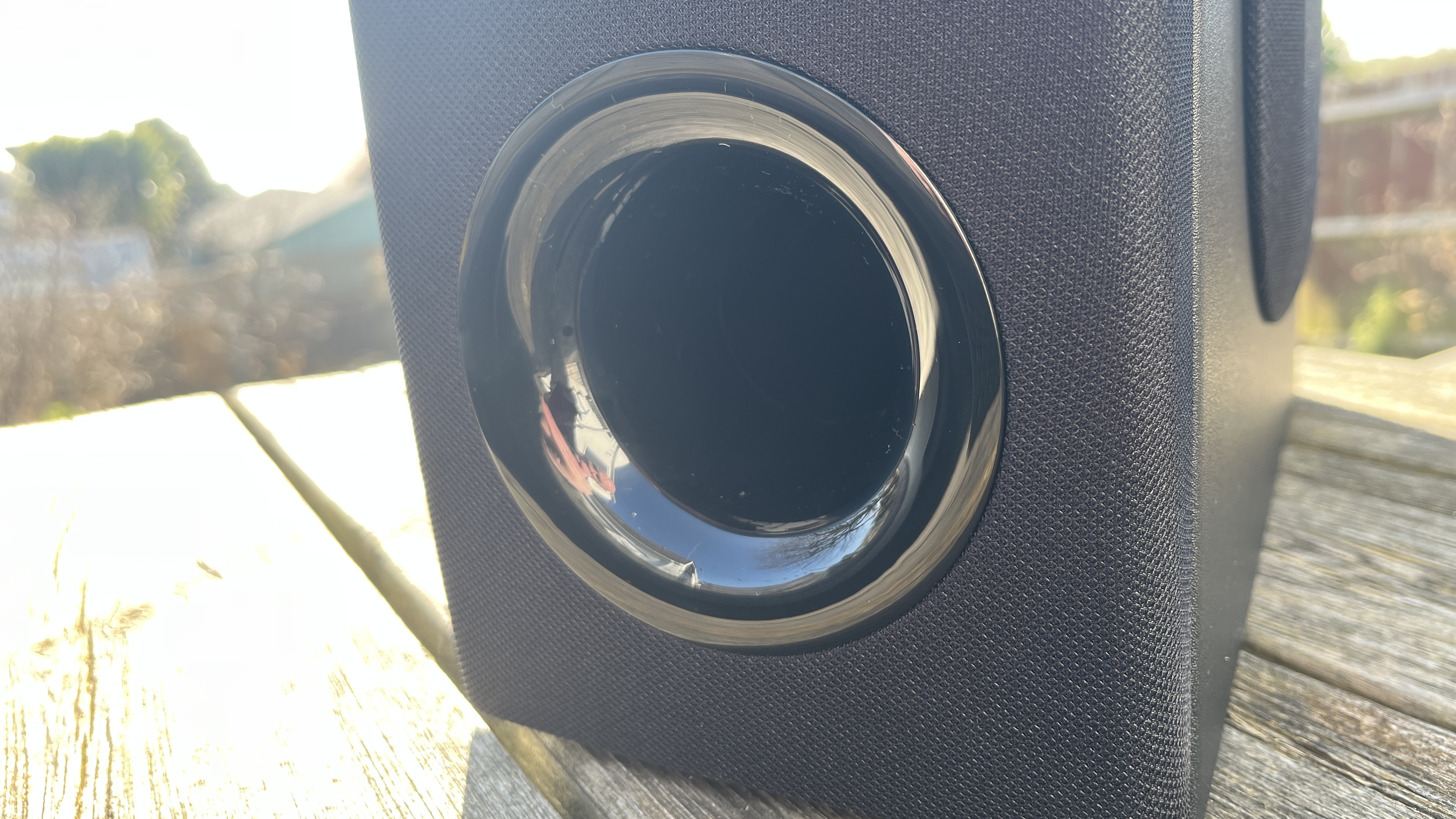
Yamaha SR-C30A review: Sound quality
- Full-figured, quite forceful presentation
- Detailed and revealing listen
- Sub and soundbar not always on the same page
No matter how compact or affordable your soundbar is, it has one fundamental job: to make the TV that it's accompanying sound a bit feeble. And the Yamaha passes this initial test in refined style. In fact, given that it will happily accompany the smallest TVs, it will probably represent quite a significant upgrade.
It doesn't deliver the most expansive sound I've ever heard from the best soundbars, it's true. But it's an altogether more informative listen than most affordable TVs it's likely to accompany. Detail levels are high, and the SR-C30A can retain and transmit even a soundtrack's finest or most fleeting elements.
It reaches impressively high up the frequency range for a speaker with no dedicated tweeters and creates crisp, fairly powerful treble sounds. At the opposite end, the wireless subwoofer hits with depth and determination, generating low-frequency sounds that are straight-edged, decently detailed and controlled enough not to fall to pieces when the musical elements of a soundtrack are to the fore.
And in between, the Yamaha communicates freely through the midrange and the SR-C30A projects dialogue well. Those impressive levels of detail are useful here, and the sensation of a soundstage is such that the speech is delivered with positivity.
There's reasonable dynamic headroom available too, so in the few moments where this soundtrack gets lively, the Yamaha has scale and drive in reserve. It organizes its soundstage well enough to let every element do its thing without being crowded by the others – and even though it's not an especially big listen, it creates a convincing impression of space.
The main problems arise in the relationship between the soundbar and the subwoofer. Switching off the subwoofer makes it apparent that the soundbar doesn't extend far down the frequency range, leaving the subwoofer with plenty of work to get through once the mid-range modulates into the upper low-frequency range – which is fine. But the handover between the two isn't the smoothest you've ever heard, and while they're both quite detailed and positive speakers, the soundbar and the subwoofer don't share an awful lot in common where tonality is concerned. Balancing the subwoofer's output against the soundbar's is easily done using the remote control or the app, but the point at which one takes over from the other is always pretty obvious.
This is obviously a bit of an irritant to us AV fanatics – it will be less of an issue to people who just want more sound for a small TV, though.
It's a similar story should you stream some music to the SR-C30A. The Yamaha's never less than upfront and engaging. Still, the variance between soundbar and subwoofer is made even more apparent by music than it is by a movie soundtrack – and while the subwoofer's authority is such that it can do a decent job in expressing rhythms, the low frequencies sound just slightly estranged from the rest of the frequency information.
- Audio performance: 4/5
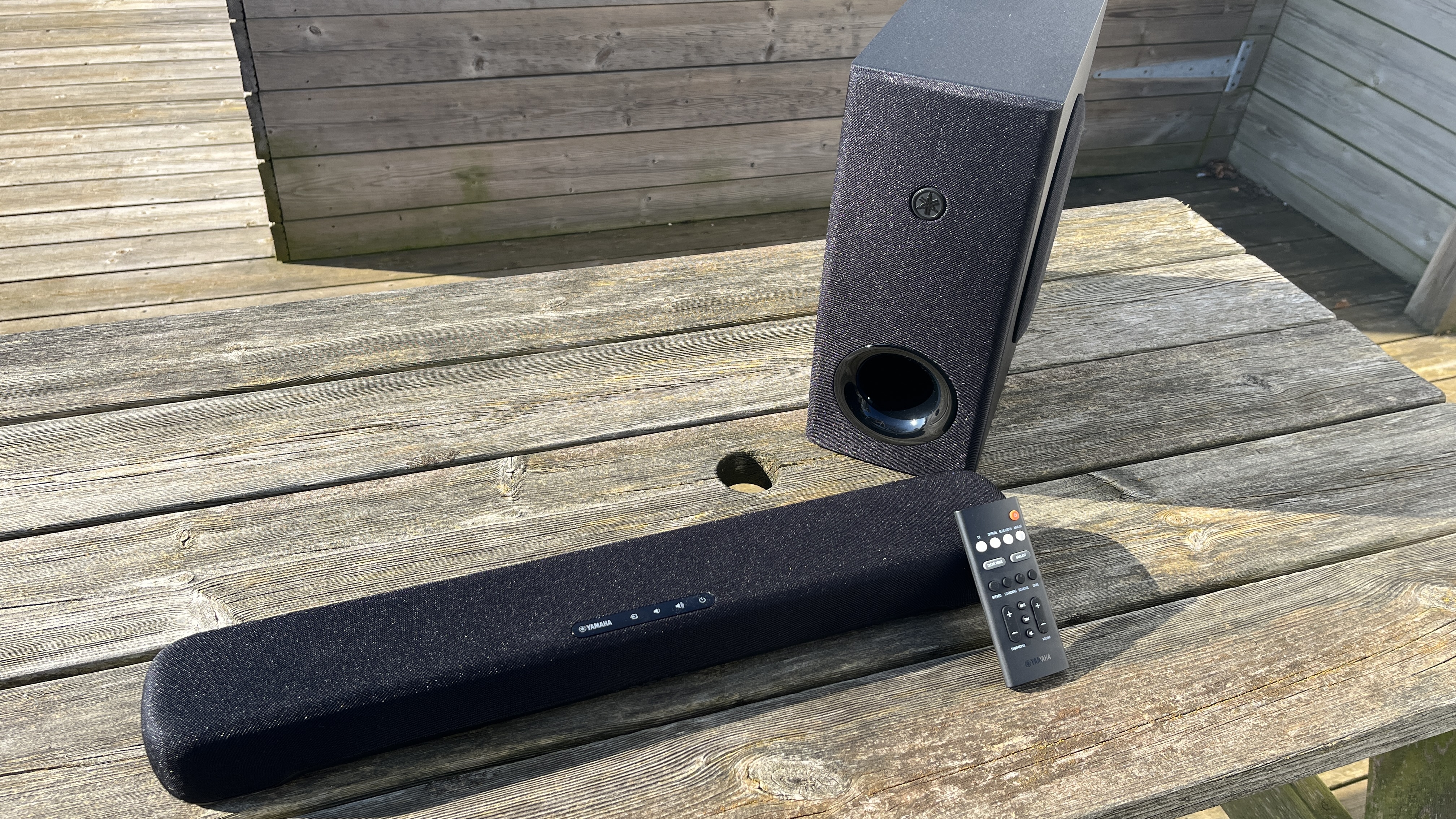

Yamaha SR-C30A review: Design
- Separate soundbar and subwoofer components
- Soundbar very compact
- Fabric covering is nice and discreet
The Yamaha SR-C30A looks like a soundbar but much, much smaller. At a mere 600mm (23.5 inches) wide, it’ll fit happily beneath small TVs or gaming monitors, and its light weight means you could take it from room to room if you want without much hassle. The wireless subwoofer accompanying it is a little more regular in its dimensions, but it, too, is discreet enough to do its thing without drawing attention to itself. Not visually, anyhow.
Build quality is standard Yamaha, which is to say it’s flawless. Given the asking price, it would be optimistic to expect particularly indulgent materials. Sure enough, the soundbar is made up of a combination of ordinary-feeling plastic and a quantity of acoustic cloth. The subwoofer, meanwhile, is big on vinyl-wrapped chipboard, with just the face and the side-firing bass driver enjoying a touch of acoustic material. There’s also a front-facing reflex port here, and it’s trimmed in glossy plastic that adds just a hint of visual pizazz.
The subwoofer’s rear has a connection for power and two tiny LEDs indicating ‘standby’ and ‘wirelessly paired’. There’s an equally small ‘pairing’ button for use if the soundbar and subwoofer don’t get acquainted automatically. Look at the soundbar's rear; this is where you’ll find keyhole fixing points in case you wish to wall-mount your SR-C30A.
- Design score: 4.5/5
Yamaha SR-C30A review: Usability and setup
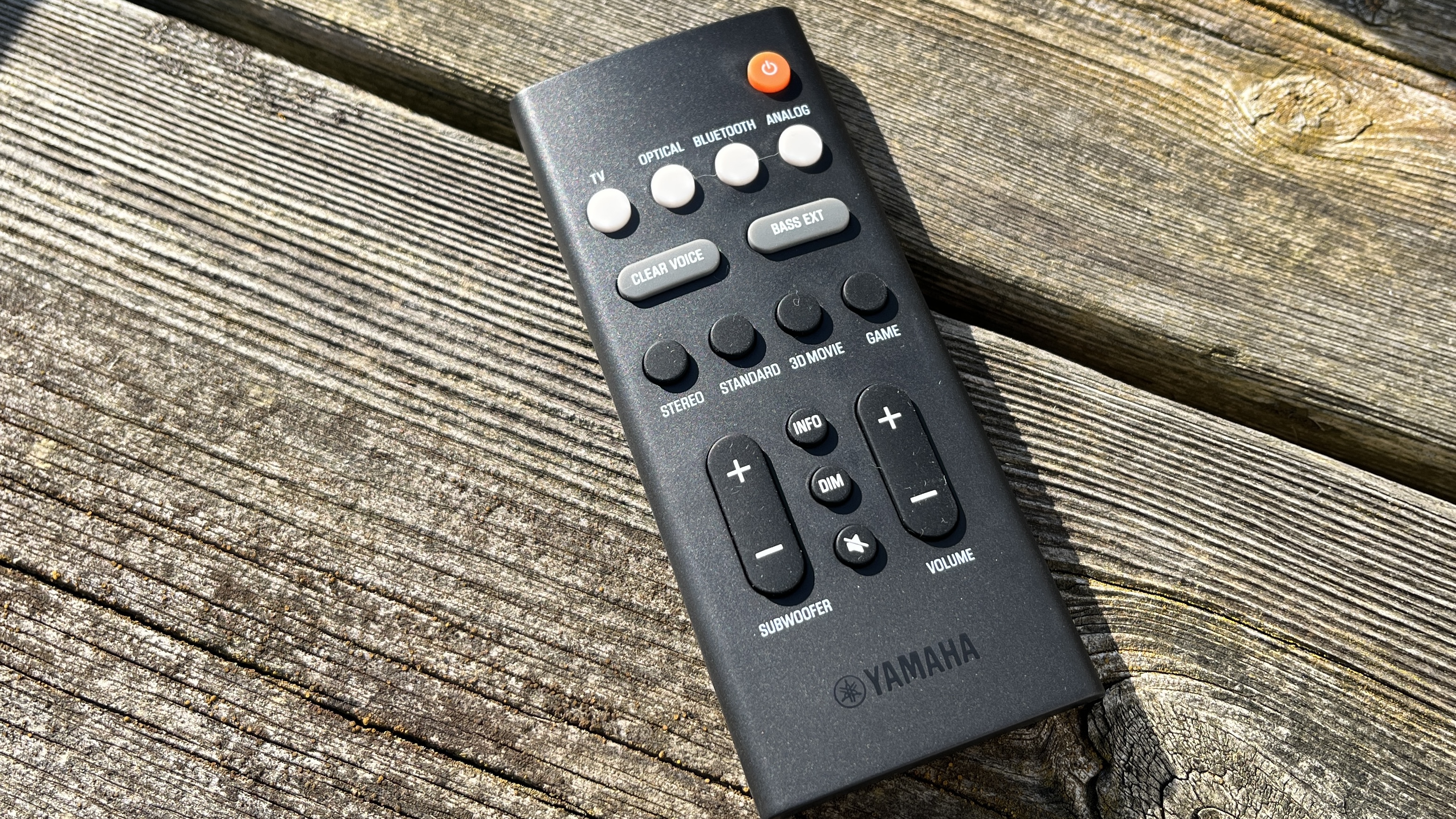
You’ve got several options when it comes to controlling the SR-C30A. You can use your TV’s remote control to deal with volume (if you’ve made an HDMI ARC connection), but the Yamaha ships with a full-function remote control of its own. It’s small and plasticky, sure, but it gets the job done – here’s where you can turn the power ‘on’ or ‘off’, select the input you wish to use, and adjust the subwoofer’s volume as well as the overall system output.
The control marked ‘clear voice’ pushes the midrange forward, while ‘bass ext’ does the same for the low frequencies. There’s a ‘mute’ button and a button for each SR-C30A’s EQ settings (‘stereo’, ‘standard’, ‘3D movie’ and ‘game’). There’s a button to dim the little LED tell-tale lights on the front of the soundbar and a button labelled ‘info’ that I couldn’t get to do anything obvious, no matter how often I pressed it.
There are a few capacitive touch-controls on the top of the soundbar, covering ‘input selection’, ‘volume up/down’ and ‘power on/off’. Or you may decide to use Yamaha’s ‘Sound Bar Remote’ control app – it’s just a single page, but it covers all the functions included on the physical remote control and is as stable and usable as these things ever get.
Everything worked perfectly out of the box – the soundbar and sub paired wirelessly without issues, and connecting the HDMI cable got me sound without any further fuss required.
- Usability and setup score: 4.5/5
Yamaha SR-C30A review: Value
For this price, you can do a little better on sound for movies, particularly from the Sony HT-G700 – but it's a pretty small list of soundbars that match it. And the Yamaha is better with music than the Sony (which is not good for tunes at all), so it's swings and roundabouts anyway.
And while it's not exactly packed with features, soundbars at this price rarely are – it's got enough going on to satisfy us, and it's all so easy to set up, and overall satisfying to listen to (especially compared to the built-in sound).
- Value score: 4.5/5
Should you buy the Yamaha SR-C30A?
| Section | Notes | Score |
|---|---|---|
| Features | 90 watts of Class D power, HDMI ARC and Bluetooth 5.0 inputs, comes with a remote. | 3.5/5 |
| Sound quality | Full-figured, quite forceful presentation but sub and soundbar not always on the same page. | 4/5 |
| Design | Very compact design, separate soundbar and subwoofer components. | 4/5 |
| Usability and setup | Very slick, very easy, and with good options. | 4.5/5 |
| Value | You can get better sound at the price, but not at the same size. | 4.5/5 |
Buy it if...
'Small but perfectly formed’ sounds just the ticket
‘Compact’ is too tentative a word to describe the SR-C30A – it's adorably tiny!
You’re no fan of spatial audio anyway
2.1-channel stereo is what you’re getting here, and it does it very well.
You like to keep your (control) options open
Touch controls? Nice logical app? Take your pick.
Don't buy it if...
You’re expecting a great big sound
The Yamaha creates a convincing soundstage, but it’s relatively confined.
You’re after full-on performance with music as well as movies
The slight lack of sympathy between the two units here is made more obvious by music.
You want Dolby Atmos excitement
There are soundbars in the same kind of price bracket with spatial sound that's more expansive.
Yamaha SR-C30A review: Also consider
Sony HT-G700
Now a couple of years old, the Sony HT-G700 has fallen to the same kind of price as the Yamaha, but delivers virtual Dolby Atmos sound that's very effective and large-scale. It's bigger, though – suitable for TVs of 48 inches and up.
Sonos Beam (Gen 2)
If it's the small design of the Yamaha SR-C30A that appeals to you, take a look at the latest Sonos Beam. It's more expensive, but is designed for compact spaces and tiny TVs, and is excellent with music too.
Sony HT-X8500
If you can find this on a deal, this is excellent value. It's Dolby Atmos and DTS:X compatible with blockbuster audio performance overall consider the price bracket – but its official price is now about the same as the Yamaha or the Sony HT-G700 mentioned above, and that Sony model is superior. But if this has a price cut to put some distance between them, this is hard to beat.
Simon Lucas is a senior editorial professional with deep experience of print/digital publishing and the consumer electronics landscape. Based in Brighton, Simon worked at TechRadar's sister site What HiFi? for a number of years, as both a features editor and a digital editor, before embarking on a career in freelance consultancy, content creation, and journalism for some of the biggest brands and publications in the world.
With enormous expertise in all things home entertainment, Simon reviews everything from turntables to soundbars for TechRadar, and also likes to dip his toes into longform features and buying guides. His bylines include GQ, The Guardian, Hi-Fi+, Metro, The Observer, Pocket Lint, Shortlist, Stuff T3, Tom's Guide, Trusted Reviews, and more.
